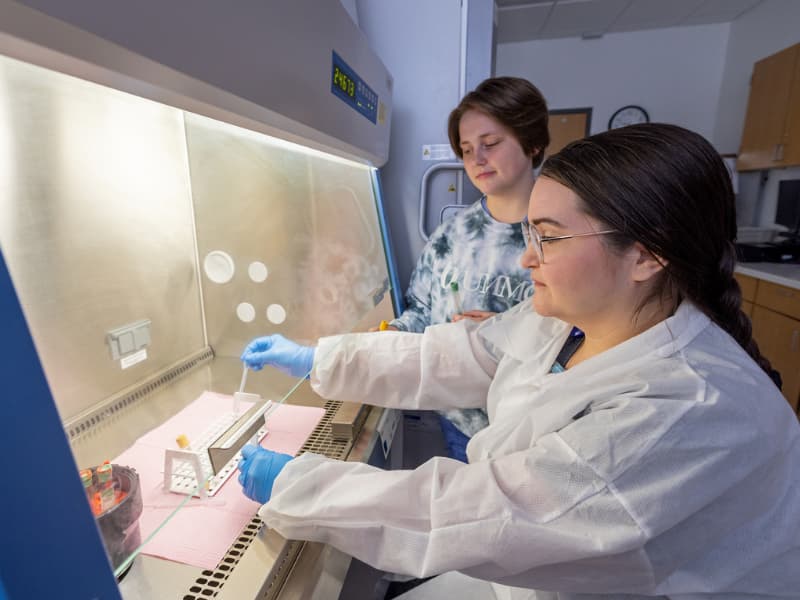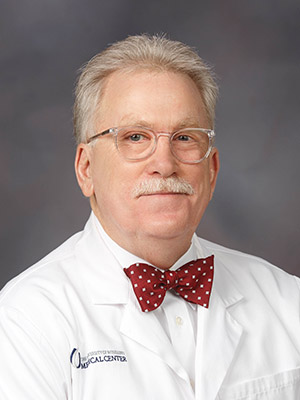Researchers recruit study participants for treatment of long COVID

The pandemic may be officially over, but many are still suffering from symptoms of long COVID, which can be debilitating.
After researching why some people with COVID-19 develop long-term symptoms while others recover completely as part of the national RECOVER (Researching COVID to Enhance Recovery) observational study for the last year-and-a-half, scientists have widened their net to include treatment.
Data gleaned from the initial study was used to develop RECOVER-Vital, a phase 2 clinical trial that will study viral persistence, which could occur if the virus that causes COVID-19 stays in the body, preventing the immune system from working properly or damaging organs.
UMMC is one of more than 30 medical centers participating in the trial, of which Marshall hopes to recruit 30 participants. Researchers will study a variety of potential treatments, including drugs, biologics, medical devices and other therapies.
Dr. Gailen Marshall, R. Faser Triplett Chair of Allergy and Immunology, lead investigator for the UMMC initial RECOVER study site, is also leading RECOVER-Vital and actively recruiting participants.

“Long COVID is still affecting more than 10 percent of patients who had COVID during the pandemic,” said Marshall. “People are still getting COVID-19, and a percentage of them go on to develop long COVID.
“The information we gather will be useful for other viral diseases such as influenza and future viral pandemics, which have been widely predicted by the World Health Organization and the Centers for Disease Control and Prevention.”
Interventions not showing any promise can end so that the trial can quickly shift to testing other potential treatments.
“We know that when patients are suffering, we can never move fast enough,” said Acting NIH Director Lawrence Tabak. “NIH is committed to a highly coordinated and scientifically rigorous approach to find treatments that will provide relief for the millions of people living with long COVID.”
In all, the National Institutes of Health has dedicated about $1 billion in funding over four years for RECOVER studies.
Though long COVID symptoms are sometimes the same as COVID-19, they may also be different and include symptoms of chronic fatigue, even triggering health conditions such as diabetes or kidney disease.
Symptoms can linger for weeks, months or years, with some recovering only to see symptoms return, or developing new symptoms within a few months. Some who had no symptoms while infected can develop symptoms later.
RECOVER-Vital involves at most nine visits over a six-month period, said Thomas Hudson, research coordinator of the Mississippi Clinical Research and Trials Center clinical research support program. Depending on the specific treatments a participant receives, trials may be shorter with fewer visits.
Participants receiving the Paxlovid treatment, for instance, will take the prescription drug – commonly used to treat COVID-19 patients – or a placebo for 25 days, with follow up visits to evaluate symptoms and additional testing.
In another trial that began recruiting this month, Marshall is also principal investigating whether Immulina, a natural supplement produced at the University of Mississippi School of Pharmacy, is an effective treatment for long COVID. An ongoing study of the supplement is already researching whether it is an effective treatment for the influenza virus.
Funded by the National Institute of General Medical Sciences, the budget for the new Immulina trial – Immulina-PASC – is $1.1 million. UMMC is leading the study, which includes nine other medical centers. Participants will take either the supplement or a placebo for eight weeks.
“The intent is to complete this early trial as soon as possible,” Marshall said. “If the results suggest a benefit of consuming Immulina, then we will go back to NIH to apply for additional funds to do a more comprehensive assessment of the clinical value of Immulina — how much, how long, in which specific patients.”
Participants for both trials, who must be at least 18, will be compensated for their time and travel, said Hudson.
They must also have evidence of inflammation, as determined by blood tests, and symptoms including persistent fatigue, brain fog and/or shortness of breath, said Marshall.
Each trial also has specific criteria for which participants will be assessed before beginning the trial.
The same team of researchers is working on both trials at UMMC, allowing participants a choice in which trial they would like to enroll.
Marshall is excited to be leading both RECOVER-Vital and Immulina trials simultaneously.
“It will allow a more rapid assessment of interventions that may work for some patients in different ways,” he said. “Few authorities believe that any single treatment will work in all patients with long COVID, so doing two trials at once will allow a more rapid assessment of different treatments in Mississippi patients who have long COVID.”
To participate in either trial, call 601-496-7808 to schedule an initial visit.


